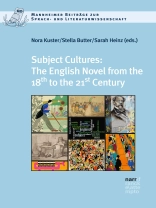This collection of essays examines the representation
of subject cultures in the English novel from the 18th
to the 21st century. It draws upon the work of Andreas
Reckwitz and connects his sociological theories
with other approaches to subjectivity. This approach
is innovative since to this date no extended study
exists that discusses subject cultures and Reckwitz’s
concepts from a literary studies perspective.
The essays concentrate on points of transition between
subject cultures and demonstrate that the
English novel functions as a key tool in articulating
as well as negotiating concepts of modern subjectivity.
Daftar Isi
Preface
Part I: Theorising Subject Cultures
Meinhard Winkgens: ‘Reckwitz’s Theory of Subject Culture in
Western Modernity.’
Part II: The Individual between Bourgeois and Romantic
Subject Culture
Maurus Roller: ‘Samuel Richardson’s Pamela: The
Aristocratic Subject and the Ascendency of the Middle Class
Cultural Order.’
Nadine Aldag: ‘Jane Eyre as an Individual Subject Between
the Bourgeois and the Romantic Subject Culture.’
Meinhard Winkgens: ‘Re-reading David Copperfield as a
Polysemic Imaginative Exploration of Bourgeois Subject Culture
and its Supplementary Romantic Other.’
Part III: Creative Transformations of the Organisation Man
Isa Maubach: ‘Metatheoretical reflections on the creativity
imperative.’
Marie-Theres Wieme: ‘A.S. Byatt’s The Children’s Book.’
Sarah Heinz: ‘Challenging the Organisation Man: Normality
and Normalisation in the Contemporary Anglophone Novel.’
Stefan Glomb: ‘The Hybrid Individual in Ian Mc Ewan’s Chesil
Beach.’
Nora Kuster: ‘Bringing down the house: De/Constructing
20th century middle-class subjectivity in JG Ballard’s High
Rise.’
Stella Butter: ‘Representations of Ideal Homes in English
Culture: Gracious Living and the Creative Self in Matthew
Reynolds’ Designs for a Happy Home.’












